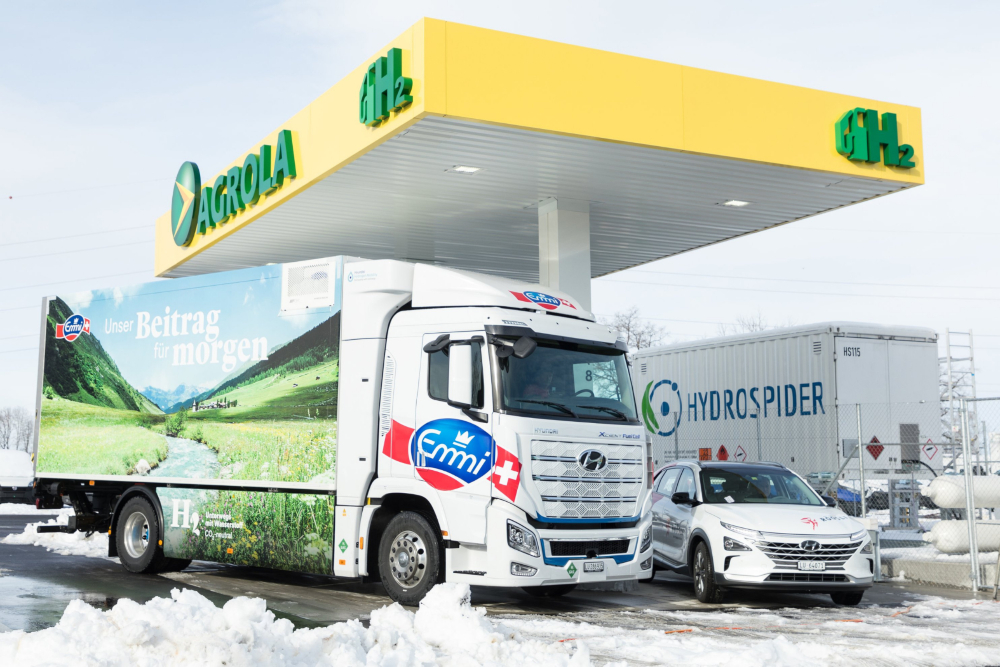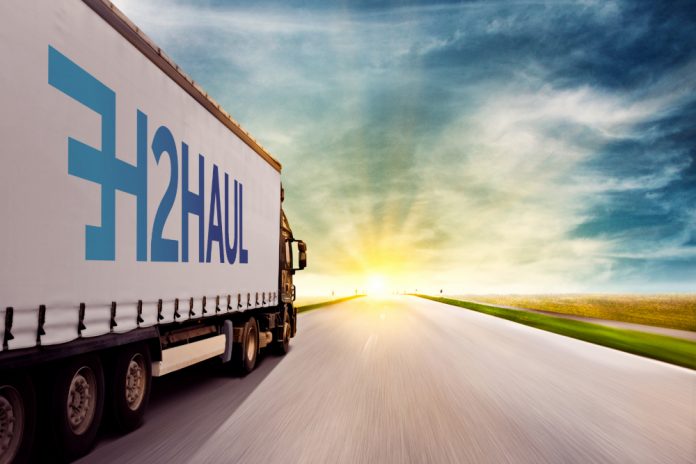Is hydrogen the answer to decarbonise the heavy-duty transport sector? Amy Allsop, Project Assistant and Sabrine Skiker, EU Policy Manager for H2Haul explore
A 90% reduction in transport emissions is necessary to achieve the European Green Deal objectives of carbon neutrality by 2050.
The additional figures below illustrate the tremendous challenge and complexity of meeting this target:
- The heavy-duty transport sector is responsible for 5% of all EU emissions and accounts for 27% of road transport emissions. In parallel, heavy-duty vehicle traffic is expected to increase dramatically as more goods are transported.
- Today, 97.8% of all trucks in the EU run on diesel, while petrol fuels 1.3% of the fleet. And only a tiny percentage of all trucks, 0.04%, are zero-emissions.
- European truck makers estimate that around 200,000 zero-emission trucks will have to be in operation by 2030 to comply with the CO2 targets for heavy-duty trucks of 30% emissions reduction in 2030 compared with a 2019 baseline.
While these figures may be alarming, some technologies are being developed and deployed to offer an environmentally friendly solution: hydrogen-powered trucks.
Hydrogen-powered trucks offer a promising solution for the heavy-duty sector’s decarbonisation while providing similar operational flexibility and payload as conventionally fuelled trucks but without harmful tailpipe emissions.
Moreover, hydrogen-powered trucks operate silently, allowing flexible delivery times in urban areas and improving driver comfort. On the regulatory side, hydrogen trucks are the best solution to comply with the CO2 emission standards for heavy-duty vehicles, which addresses long-haul trucks. Other tailpipe zero-emission technologies will have technical limitations.
A strong commitment to carbon neutrality in Europe
The heavy-duty transport sector recognises that it is crucial to act now to tackle climate change. For this reason, in March 2020, during a fuel cell truck event in Brussels, the ‘Joint call for the deployment of hydrogen fuel cell trucks: a needed shift towards a carbon-neutral society’ was unveiled. This letter of intent demonstrated that the supply side is prepared to deploy fuel cell trucks and infrastructure. Forty-four major companies representing the entire supply chain pledged their support to deliver between 5,000 and 10,000 hydrogen-powered trucks by 2025 and a minimum of 100 hydrogen refuelling stations by then.
Furthermore, in November 2020, another milestone towards the decarbonisation of the heavy-duty industry in Europe was revealed: a coalition statement supported by 62 signatories. This time it involved the supply side with OEMs, fuel cell and hydrogen technology suppliers, refuelling and hydrogen infrastructure providers, and the demand side with truck operators and users of road freight services. The industry joined forces to cement their commitment to meet the Green Deal’s objectives by highlighting the role of hydrogen technologies and committing to 100,000 hydrogen-powered trucks and 1,500 refueling stations from 2030 onwards. The number of registered hydrogen-powered vehicles is then expected to double every year from 2030.
The companies that participated in the March and November joint statements have made progress in their commitment to hydrogen. Other companies have embarked on their hydrogen journey, especially shippers, carriers, logistics service providers. These statements show the commitment of all actors, even though the COVID-19 pandemic has hit the sector hard. Supply and demand must work hand in hand to make this environmental shift happen. As a first step, a Memorandum of Understanding was signed between Hydrogen Europe and ALICE logistics platform.
In the meantime, hydrogen trucks and hydrogen refuelling stations are already being introduced today – Hyundai plans to deploy 1,600 trucks in Switzerland by 2025.
H2Haul: A flagship project leading change in the sector
Building on the need to decarbonise the heavy-duty transport sector and test hydrogen technologies, the H2Haul (Hydrogen Fuel Cell Trucks for Heavy Duty Zero Emissions Logistics) project was launched in 2019. H2Haul seeks to deploy 16 heavy-duty hydrogen fuel cell trucks in 4 European countries: Belgium, France, Germany, and Switzerland. This flagship project is co-funded by the Fuel Cell and Hydrogen Joint Undertaking (FCH JU). It has 16 partners – ranging from OEMs to fuel cell suppliers and end-users. In addition, new high-capacity hydrogen refuelling stations will be installed to supply the trucks with low-carbon or renewable hydrogen reliably.
This innovative project’s scope and ambition will create a range of valuable information that will be widely disseminated to truck operators, retail sector representatives, policymakers, and the hydrogen industry. H2Haul will, therefore, validate the ability of hydrogen fuel cell trucks to provide zero-emission mobility in heavy-duty applications. It will lay the foundation for the commercialisation of this sector in Europe during the 2020s.
The first hydrogen refuelling station from the project was opened on 28 January 2021 in the Swiss region of Lucerne. The station supplies trucks and cars with green hydrogen produced in Switzerland from renewable sources. Stations are also being prepared at other deployment sites, such as Fos-sur-Mer in France. FPT Industrial, IVECO and VDL are developing the trucks which are due to be deployed from 2022.

On 9 March 2021, H2Haul received the Hydrogen Transport Award at the first edition of the World Hydrogen Awards organised by the Sustainable Energy Council. The Annual World Hydrogen Awards honour companies’ outstanding contributions and individuals who are driving the hydrogen industry forward. This award is a testament to H2Haul’s enormous potential as a driving force behind the decarbonisation of Europe’s heavy-duty transport sector.
Paving the road for a carbon-neutral Europe is not an impossible task. Initiatives like H2Haul are of critical importance to deploy the technology and ensure a clean future at the European and global level, in which hydrogen has a pivotal role to play.
*Please note: this is a commercial profile











